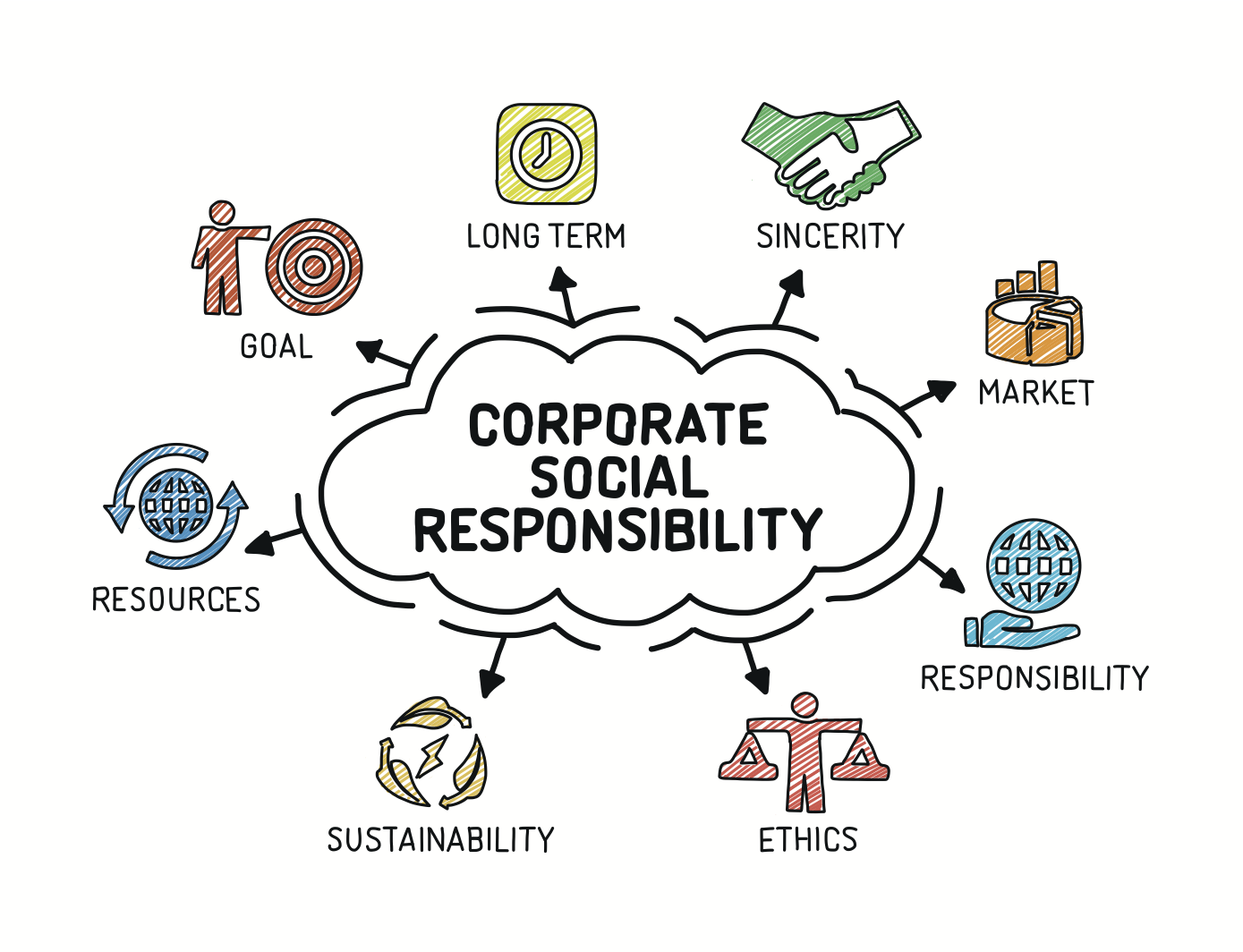How Being Responsive to Others Can Help You Achieve Your Goals
Social responsibility is not only a moral imperative but also a catalyst for personal and professional growth. By embracing social responsibility, individuals can enhance their empathy, expand their perspectives, and foster meaningful relationships. In the professional realm, social responsibility contributes to building a positive reputation, attracting talented employees, and cultivating customer loyalty. The synergy between personal and professional growth becomes evident through the development of transferable skills, increased motivation, and expanded networks. By prioritizing social responsibility, individuals and organizations can make a positive impact while reaching their goals.

How Social Responsibility Can Help You Reach Your Goals
In today's interconnected world, social responsibility has become a significant aspect of both personal and professional endeavors. It involves individuals and organizations actively contributing to the betterment of society while achieving their goals. In this article, we will explore how embracing social responsibility can have a positive impact on your personal growth, professional success, and overall satisfaction.
Understanding Social Responsibility
Social responsibility is a concept that emphasizes the ethical obligation of individuals and organizations to contribute positively to society and the environment. It involves taking proactive steps to make a difference and address social and environmental challenges. By actively engaging in social responsibility, individuals and organizations acknowledge the importance of being accountable for their actions and impact on the world around them.
At its core, social responsibility involves going beyond self-interest and considering the broader consequences of our choices and actions. It encompasses various activities and initiatives aimed at improving the well-being of communities, protecting the environment, and promoting social justice. These can include philanthropy, volunteer work, sustainable practices, ethical business operations, and community engagement.
Social responsibility recognizes that we are all interconnected and that our actions have ripple effects. It acknowledges that economic success and personal fulfillment should not come at the expense of others or the planet. Instead, it emphasizes the need to create a balance where progress and prosperity are achieved while ensuring the long-term sustainability and well-being of society as a whole.
By embracing social responsibility, individuals and organizations have the opportunity to make a positive impact and contribute to the greater good. It is a way to channel resources, expertise, and influence toward addressing pressing social and environmental issues. It allows us to leverage our skills, knowledge, and resources to create meaningful change and improve the lives of others.
Moreover, social responsibility also has personal benefits. Engaging in socially responsible activities can broaden our perspectives, increase our empathy and compassion, and enhance our understanding of diverse communities and cultures. It can provide a sense of purpose and fulfillment, as we align our actions with our values and work towards something greater than ourselves.
social responsibility is about taking responsibility for the impact of our actions and actively working towards positive change. It is a mindset and a commitment to making a difference, both individually and collectively. By embracing social responsibility, we can contribute to a more equitable, sustainable, and compassionate world.
Social Responsibility in Personal Development
Enhancing Empathy and Compassion
When individuals engage in social responsibility, they often encounter diverse communities and individuals facing different challenges. By actively participating in initiatives aimed at helping others, one can develop a deeper sense of empathy and compassion. Understanding the struggles and triumphs of others fosters a broader perspective and nurtures a sense of shared humanity.
Expanding Perspectives and Cultural Awareness
Social responsibility often involves collaborating with people from various backgrounds and cultures. This interaction provides a unique opportunity to broaden one's perspectives and gain cultural awareness. By embracing diversity, individuals can break down barriers, challenge stereotypes, and foster a more inclusive society.
Fostering Meaningful Relationships
Engaging in social responsibility initiatives enables individuals to connect with like-minded individuals who share similar values and aspirations. These connections can lead to the formation of meaningful relationships and networks, providing support, inspiration, and collaboration opportunities. By surrounding oneself with a supportive community, personal growth becomes more fulfilling and achievable.
Social Responsibility in Professional Success
Building a Positive Reputation
Companies that prioritize social responsibility are more likely to establish a positive reputation in the eyes of consumers and stakeholders. Engaging in initiatives that benefit society showcases a genuine commitment beyond profit-making, which resonates with customers who value ethical practices. A positive reputation contributes to brand loyalty and can attract new customers who align with the company's values.
Attracting and Retaining Talented Employees
In today's competitive job market, top talents seek more than just financial compensation. Many professionals prioritize working for organizations that demonstrate a commitment to social responsibility. By integrating social responsibility into their corporate culture, companies can attract and retain skilled employees who are passionate about making a difference in the world.
Cultivating Customer Loyalty
Consumers increasingly expect companies to be socially responsible. By aligning their products and services with meaningful initiatives, companies can build trust and loyalty among their customer base. When customers perceive a company as socially responsible, they are more likely to support its growth and recommend it to others, ultimately driving long-term success.
The Synergy between Personal and Professional Growth
Transferable Skills and Knowledge
Engaging in social responsibility initiatives allows individuals to develop a wide range of transferable skills. These skills, such as leadership, problem-solving, and communication, can be applied both in personal and professional contexts. Social responsibility experiences provide valuable learning opportunities that enhance an individual's overall capabilities and versatility.
Increased Motivation and Purpose
When individuals contribute to causes that align with their values, it fosters a sense of purpose and fulfillment. Social responsibility can be a powerful motivator, propelling individuals to overcome challenges and persevere in their personal and professional pursuits. The knowledge that their actions are making a positive impact fuels their drive to achieve their goals.
Broadened Network and Opportunities
Engaging in social responsibility activities exposes individuals to a diverse range of networks and opportunities. By connecting with individuals who share similar values and aspirations, individuals can tap into new avenues for personal and professional growth. These networks can provide mentorship, collaboration opportunities, and access to resources that help individuals reach their goals more effectively.
Conclusion
Social responsibility is not only a moral imperative but also a catalyst for personal and professional growth. By embracing social responsibility, individuals can enhance their empathy, expand their perspectives, and foster meaningful relationships. In the professional realm, social responsibility contributes to building a positive reputation, attracting talented employees, and cultivating customer loyalty. The synergy between personal and professional growth becomes evident through the development of transferable skills, increased motivation, and expanded networks. By prioritizing social responsibility, individuals and organizations can make a positive impact while reaching their goals.
FAQs
How can social responsibility benefit my personal growth?
Engaging in social responsibility activities can enhance your empathy and compassion, expand your perspectives, and foster meaningful relationships.
Why is social responsibility important for professional success?
Social responsibility contributes to building a positive reputation, attracting talented employees, and cultivating customer loyalty, which are vital for professional success.
Can social responsibility help me develop transferable skills?
Yes, engaging in social responsibility initiatives allows you to develop skills such as leadership, problem-solving, and communication, which are valuable in personal and professional contexts.
How does social responsibility contribute to motivation and purpose?
Contributing to causes aligned with your values fosters a sense of purpose and fulfillment, serving as a powerful motivator in personal and professional pursuits.
What are the networking benefits of social responsibility?
Engaging in social responsibility exposes you to diverse networks, providing opportunities for mentorship, collaboration, and access to resources that can help you reach your goals effectively.
What's Your Reaction?










.jpg)









.jpg)